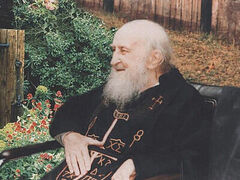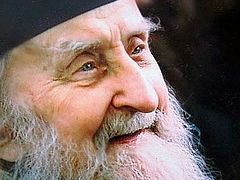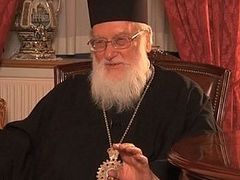Metropolitan Athanasios of Limassol shares his memories of meeting the elder Sophrony (Sakharov) and the saint’s admonitions on the issues of the confession, humility, and neglect of one’s thoughts
Being a complicated person is torture
 St. Sophrony (Sakharov) —How can one learn simplicity?
St. Sophrony (Sakharov) —How can one learn simplicity?
—That’s a good question, but it is hard to put the answer into practice. Not that it’s hard; but, unfortunately, we are complicated people, especially those who are younger. Complexity is a torment, being a complicated person is torture. Complexity is also the result of the environment we grew up in, and how we are accustomed to thinking. It is also the result of our life away from the Divine Grace. A simple man is sheer sweetness! He is grace-filled—you see him and it brings joy, so the only thing you want is to be near him. Such a man is kindhearted and free; you feel at ease and at peace next to him. A complicated person is unhappy, burned out, he tires you out, and you always get tired of him.
How do you acquire simplicity? The easiest way is to stay close to the simple people. Simple people teach simplicity. If there are such people around us—our grandparents or other simple people—let’s live near them and observe how they think and behave. Let us try to follow their example and thus learn to be simple.
We can also acquire simplicity through spiritual means—by purifying our souls from passions. If we avoid passions and sins, repent of them and weep bitterly, this weeping of ours, as well as our observance of the holy commandments, staying away from sinful worldly knowledge, being unwilling to coddle sinful thoughts and becoming evil people, reading and studing the Holy Scriptures and the lives of the saints—all of this will help us attain blessed simplicity. Blessed simplicity, as a gift of the Holy Spirit, is bestowed upon a man who cultivates prayer, who lives in and through the Holy Mysteries, and keeps his mind pure, abstaining from the worldly way of thinking.
Elder Sophrony: a man who was perfect in Christ
It took place in winter, right before Christmas under the Julian calendar, somewhere around 1970. I had already read the book by St. Sophrony of Essex, We Shall See Him as He Is. It belonged to Geronda Dionysius of Dionysiou monastery, a spiritual and holy man who lived not far from elder Sophrony. I took the book from him and gave it to our Geronda Joseph, and we read it together. When we finished reading it, Geronda Joseph said: “He is a great saint!” He was impressed by the profound depth of the theological narratives, spiritual but not academic, and St. Sophrony’s unbelievable experience. Taking advantage of this state of “spiritual exaltation,” I said, “Geronda, why don’t we go and take a blessing from Elder Sophrony while he is still alive?” Geronda Joseph replied, “Well, but how can we get to England? Do you think, my child, it’s so easy?” I suggested: “Give me your blessing and I’ll take care of it.” He agreed. I was younger and livelier at the time than I am now, so I arranged our trip to England. And so, we, Geronda Joseph and I, made a short trip to England, arranging through one of our friends to meet with Elder Sophrony.
St. Sophrony was waiting for us at the gates, next to the monastery fence. He was crossing himself and bowed
We went to the monastery straight from the airport and arrived there in the evening, about 11 pm. It was awfully cold. St. Sophrony was waiting for us at the gates, next to the monastery fence. He waited for us in this bitter cold, along with a few other brethren. As soon as Geronda Joseph got out of the cab, Elder Sophrony began to bow. He was crossing himself and bowing. He would bow down as low as his strength allowed—he was already advanced in years. We felt awkward. He hugged and kissed us, and said: “Welcome to England! Let’s go to church and pray.” We went to church and prayed. He commemorated our names in a very heartwarming way.
We remained in the monastery for two days and two nights. Throughout this time, we had meetings and conversations with Elder Sophrony. He shared his memories of the Holy Mountain, of Elder Joseph the Hesychast, St. Silouan, and spoke about his experience of concelebrating Divine Liturgy with him. We held conversations on various spiritual topics. What greatly impressed us was our very perception of the elder Sophrony. He was a man who was perfect in Christ. Geronda Joseph said of him, “If you desire to see a perfect man, look at this elder. If you wish to know how the Gospel transforms a man, look at him—he is indeed a man perfect in Christ.” Such was our impression. Afterwards, the elder Sophrony blessed us in all his goodness, both spiritual and human, talking to us in all seriousness and sublimity, welcoming us with all humility and love. The image of his holiness will always remain with us!
What should I do about a wrong-doer?
—If someone constantly offends me, what is the proper Christian way to respond?
—The distinctive quality of a Christian is humility. If we humble ourselves, we will benefit greatly. Therefore, he who humbles us is our benefactor. But we should also exercise reasoning. For example, a teacher, or a parent, that is, someone who has to bring up children, he may humble himself when children disobey him and misbehave, but it is detrimental to the children themselves. For their own good, we should bring them back to their senses using specific instructional methods. In this situation, we can’t simply say “with humility:” it’s OK, let the classroom or a room turn into the Augean stables, and everything lies in a complete mess. It is necessary for my humility! Wrong! It will do no good if you allow the naughty children to go on causing the mischief.
If a brother upsets or offends us because of his bad disposition, there is nothing we can do about it, and we should endure it and pray. It will help us spiritually. But if we are responsible for this brother, if we are teachers, parents, employers, then, of course, using reasoning, we should calmly put things in order—so that the work we must perform gets done and we also do no harm to our brother. Since in the end, it is the brother behaving badly towards us who ends up in harm’s way.
The best way to control our thoughts is to ignore them
—How can we differentiate our thoughts?
—Thoughts proceed from three sources: God, the devil, and man. Good and holy thoughts proceed from God; they bring joy and peace to the heart of man. Evil thoughts come from the devil: they bring confusion, darkness, profanity, and wickedness. Human thoughts arise from a man and his surroundings, but since we are regretibly overcome with passions, we often produce evil thoughts.
What does the thought tell us: anything that is good? If it tells of good things, in harmony with the commandments of God and the Holy Gospel, we should keep it. If a thought tells us things opposite of the law of God and the Holy Gospel, we should disregard it.
How should we guide our thoughts? The holy fathers advise us to exercise ignorance. The best way to manage thoughts is to ignore them, not taking them into consideration. If you see that you have an evil thought and it disturbs or confuses you, your mind grows dark, or it oppresses you, chase it away, don’t hang on to it. Attach no importance to it. Don’t preoccupy your mind with it. Otherwise you will lose time, mood, and strength.
To guide your thoughts is truly a matter of advanced spiritual knowledge. Ignoring them is the most effective remedy. If you don’t learn to ignore your thoughts, you will suffer all the time.
Pride and despair are two sides of the same coin
I think, and this is how the holy fathers are teaching us, these two are two sides of the same coin called egoism. The egoist thinks that he, and no one else, is a saint and an angel who never gets it wrong. Whereas in reality he is imperfect and makes mistakes just like everyone else, being the most ordinary person but one who falls into despair because of his egoism. Despair is not good. It is an expression of egoism. A humble person, even if he commits a sin, will say: Well, all right, I am a human, after all! He repents of his sin, humbling himself, confessing, struggling, and rising again. He appeals to God to help him and not to fall into despair.
A humble person, even if he commits a sin, will say: come on, I’m only a human! He appeals to God to help him and not to fall into despair
Despair is a great fall and a great sin. A humble man does not lose courage, has trust in the Lord, asks Him to forgive his sin, and invokes His grace. Our salvation lies in humility. But a proud man creates a false self-image in his mind, and when it turns out that in reality everything is not as he thinks, he despairs and loses any desire to take action. That’s why despair and pride are two sides of the same coin.
—How should we confess properly?
—Confession is like to a spiritual bath that purges us from our sins. At confession, it is necessary that we precisely pinpoint our sins and misdeeds, but omit the specifics. We shouldn’t describe them—especially carnal sins—in great detail, but rather call them out in concrete terms, by name, so that our father confessor can determine our spiritual sickness and offer suitable spiritual medicine that will turn to be beneficial for us. We should confess with a contrite heart. As for the feeling of shame, it is a matter of humility and repentance.
Humility preserves the treasure of the spirit
—The Gospel of St. Matthew tells us how Christ healed the leper and said: See that you tell no one. Why is that so? The Lord performed these miracles not only for those people, but also for many others!
—What the Lord did, He has done for us, wishing to show us the way of salvation. He didn’t need it Himself—He is both perfect God and perfect man. He showed us a pattern of how to act: We should live humbly, in obscurity, attributing glory not to ourselves, but to the One God and our Father.
There are cases when Christ said, go and tell everyone, and others when He said, tell no one. Everything depended on the spiritual state of the one who was healed and witnessed the miracle. We also often advise others: Never tell anyone about what you’ve just seen and what has just happened to you. For, once you share it with others, you will do yourself a disservice. You will be unable to use this knowledge wisely but will swell with pride and vanity instead. Most importantly: everything should be guided by humility. Humility preserves the treasure of the spirit.
Had we lived in the days of Christ…
I remember how we were talking to our Geronda, the ever-memorable Fr. Joseph, in our skete. We said, “Geronda, how good it would have been for us to live in the times of Christ! We would have seen Christ! We would have been witnesses of His earthly life,” said one brother, full of love and reverence. The elder replied, “What a mercy, brethren, we don’t live in those times. Especially myself, for I am certain that had I lived in the days of Christ, I would have been one of those who crucified, flogged, and denounced Him. I still flog Christ daily with my sins and crucify Him. I insult Him daily with my sinful life. Had I lived then, it would have even been worse.” The saints had great humility! They did not trust themselves.
Father Paisius of Dionysiou: the “mother” of Christ
A man of deeply inner life... He lived at Dionysiou.
A Cypriot, he grew up in South Africa and resided in England. He was very successful in his economic and commercial endeavors. At some point, he met St. Sophrony of Essex and turned to God. He arrived at the monastery of Dionysiou on Mount Athos and became a monk. He lived there in strict asceticism.
This monk’s life was a stellar example of monasticism. Scrupulous, inconspicuous, humble, replete with obedience and truly inscrutable. He never went anywhere and no one knew about him. He was bestowed with many gifts of the Holy Spirit. He was a man of unceasing prayer, a man of great love, a man enlightened by the Lord Who revealed to him His all-holy will about the people who saw him.
When I first came to the Dionysiou sometime in October or November of 1976, I was overcome with many thoughts about whether or not I should stay on the Holy Mountain. Once, in the evening I walked from the Monastery of St. Paul to Dionysiou, as they were having the Compline service there. I sat down in the side chapel. I knew no one (as an eighteen-year-old student) and certainly no one knew me either. So, I sat there, in my stasidia, in the side chapel of the Laudation of the Most Holy Mother of God, contemplating my life and watching the elders of the Dionysiou; they also sat deep in their stasidia immersed in the darkness of the cathedral and reading the Compline so simply, humbly, and quietly... I was seized with despair and frustration—so I sat there, awash with thoughts: What am I doing on this Holy Mountain? All they have are these elderly monks! They look like living corpses. I am going to leave this place at once! I had a feeling that I was visiting the kingdom of the dead in this monastery. As soon as I thought that, a monk came up to me—he was lighting the oil lamps in the cathedral—and said, “You shouldn’t think this way! The monks you see aren’t dead. They are not. These fathers are filled with life—life in Christ. But when man lives in Christ, it is truly life.” I thanked him and said nothing else. I didn’t know him, nor did I know anyone else there. However, as soon as I left, I realized that it was the answer to my thoughts.
I met this monk again later. His name was Father Paisios. He maintained order in the church, and since he was also a Cypriot, we got to know each other and became friends. Elder Gabriel of Dionysiou once said of him: “This monk is like the one described by St. Simeon the New Theologian—‘he is akin to the ‘mother’ of Christ.’” I asked: “What does that mean, the ‘mother’ of Christ?” Geronda replied, “Like a mother who carries a child in her womb, is aware of him, gives birth and becomes his mother, so does a man who strives in Christ. He “conceives” Christ in his being, in his heart, and becomes a God-bearing man. This monk is a ‘mother’ of Christ, because he has Christ in his heart.”
Of course, I stayed on Mount Athos. I also often visited Dionysiou. We held conversations with this holy elder, filled with sweetness, humility, love and obedience. He always comforted us with his appearance and the gentle and comforting words.
A man of unceasing prayer, he received the monastery’s blessing at the end of his life and went into the wilderness to the remote St. James Kathisma, remaining there almost to the end of his life, enjoying the life of a recluse, in silence and prayer.




